
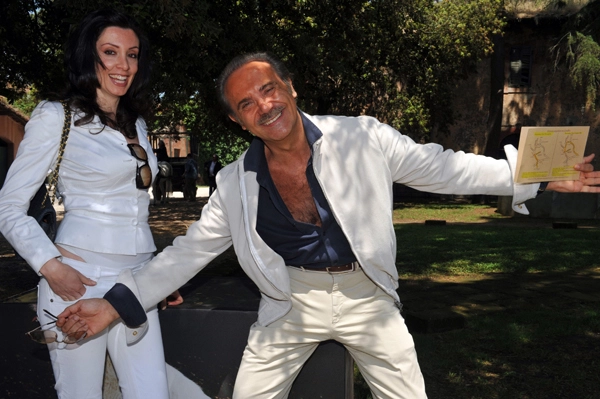
Mauro Masi accompanied by actress Susanna Smit.
In this part we turn our attention to Italy, the last of the seven "abstentionist" states that decided to withhold their support from Benoît Battistelli's "Strike Regulations".
"Masi himself was not present in Munich for the vote. The acting head of delegation on that occasion was his deputy Loredana Gulino, a director of the anti-counterfeiting department of the Italian Ministry for Economic development."As we shall see, Italy's abstention on that occasion seems to have had more to do with tensions between Battistelli and the Italian delegation than any kind of concern for EPO staff and their fundamental rights.
Back in June 2013, the Italian delegation on the EPO's Administrative Council was headed by Mauro Masi whose official title was "Delegate for Intellectual Property" at the Directorate General for Global Affairs of the Italian Ministry of Foreign Affairs.
Masi himself was not present in Munich for the vote. The acting head of delegation on that occasion was his deputy Loredana Gulino, a director of the anti-counterfeiting department of the Italian Ministry for Economic development.
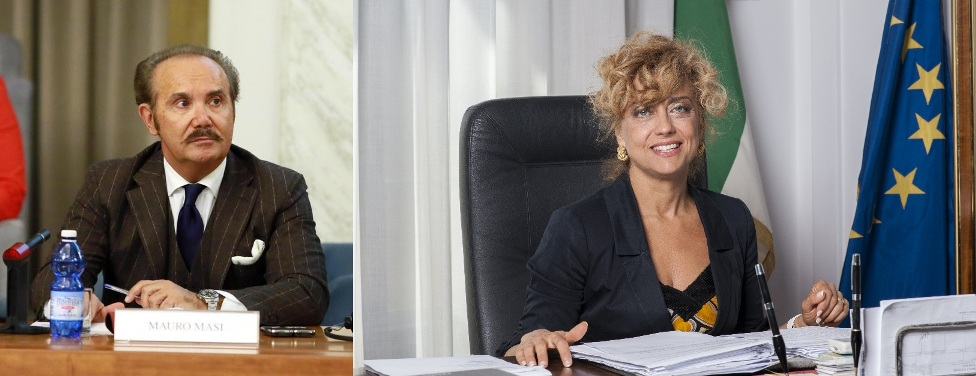
The Italian representatives: head of delegation Mauro Masi and his deputy Loredana Gulino.
"Masi has held the position of head of the Italian delegation on the EPO's Administrative Council since 2006 and he continues to hold it to this day, although he is probably due to retire in the near future."As will become apparent in due course, Masi is a very busy guy at home in Italy and it would appear that EPO affairs do not rank very high on his list of priorities. He normally delegates such matters to his deputy Loredana Gulino, an official of the Italian Ministry for Economic Development who currently heads the department responsible for "Market, Competition, Consumer Protection and Technical Regulation".
Mauro Masi (personal CV here [PDF]) was born in the Italian harbour town of Civitavecchia near Rome on 26 August 1952. After completing studies in law and economics, he began his professional career with the Italian Central Bank (known as "Bank of Italy") in 1978.
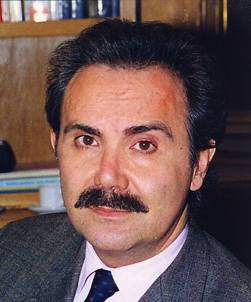
Masi began his career with the Italian Central Bank in 1978.
"In the early 2000s Masi worked on a number of legislative reform projects in the areas of copyright, publishing and the sale of published products."The Italian media described Masi as the "Zelig" of Italy's senior administrators (a reference to the "human chameleon" in the Woody Allen film of the same name).
During the 2nd and 3rd Berlusconi governments (between 2001-06) Masi held senior positions in the Presidency of the Council of Ministers.
In April 2009, he was appointed CEO of the Italian public broadcasting company RAI. In Italy the RAI appointment was generally perceived as a reward for his loyalty to Berlusconi.
Masi's term at RAI was marked by a number of public controversies.
"Masi's term at RAI was marked by a number of public controversies."For example, in 2009 in order to encourage the early retirement of two RAI directors who had fallen out of favour, Masi came up with a plan to offer them "generous" severance agreements. The "generosity" of these agreements caught the attention of the Court of Auditors which considered that Masi had been responsible for offering "unjustified economic incentives". The damage caused to the state budget was estimated to be of the order of € 680,000.
In 2012, Masi got off relatively lightly when he was ordered to pay € 100,000 for the fiscal damage caused by his actions. He appealed the decision of the Court of Auditors but this was upheld by the Italian Supreme Court in a judgment which was delivered almost a decade later in 2018.
As the CEO of RAI, Masi gained particular notoriety as Berlusconi's "media enforcer".
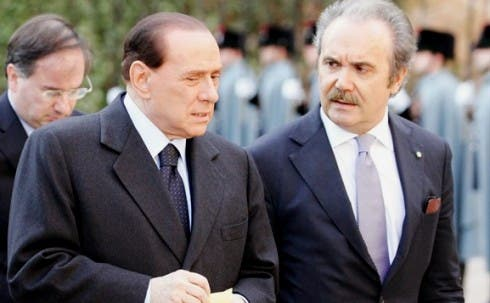
As CEO of the state broadcaster RAI between 2009 and 2011, Mauro Masi acquired an unsavoury reputation as Silvio Berlusconi's "media enforcer".
"As the CEO of RAI, Masi gained particular notoriety as Berlusconi's "media enforcer"."In addition to firing Senese, Masi ordered the program’s anchorman Michele Santoro to “re-balance” his coverage of current affairs, complaining that the programme was too "left-wing" and that it was guilty of a priori bias against members of the government on "ideological grounds".
Santoro - described by the Guardian as Italy's equivalent of Jeremy Paxman - was a veteran journalist who had also been involved in politics. He had previously served as an MEP for Southern Italy with the centre-left electoral alliance known as the "Olive Tree". As might be expected, Santoro was not impressed by what he perceived as an attempt by Berlusconi and his cronies to censor his journalistic work.
It was inevitable that the dispute between Santoro and Masi would escalate and by late 2010 foreign media were reporting on "fears for press independence" in Italy and "censorship late-Berlusconi-style".
"As might be expected, Santoro was not impressed by what he perceived as an attempt by Berlusconi and his cronies to censor his journalistic work."Santoro accused Masi of trying to sabotage the AnnoZero programme by refusing to sign contracts for his contributors and co-authors. During a live broadcast, he described Masi as incompetent and euphemistically told him to “take a walk” ("vaffanbicchiere"). Masi responded by issuing Santoro with a two-week suspension from the broadcast.
The affair turned out to be highly embarrassing for both Masi and his political padrone when the Italian media published transcripts of wiretaps which had been recorded by a public prosecutor investigating allegations of irregularities involving Berlusconi.
The wiretaps revealed Berlusconi haranguing Giancarlo Innocenzi, the head of the nominally independent broadcast regulation agency, over what he deemed to be politically hostile programming.
"What the f**k are you doing with all this?" the irate Prime Minister shouted at the commissioner, Giancarlo Innocenzi. In another call Mr Berlusconi demands that a show looking into his alleged Mafia connections be muzzled.
“We won, he's dead, we're going to bust his ass. I am horny as a beast”.
(Original: “Abbiamo vinto, è morto, gli stamo a spaccà il culo. Sò arrapato come una bestia”).
"The main topic of discussion between Masi and Bisignani was the letter of suspension that Masi intended to deliver to AnnoZero anchorman Michele Santoro after the latter had insulted him "on air"."In 2010 Berlusconi came under investigation by the Italian Court of Auditors following claims that he used as much as €400,000 in state funds to fly Bonev to the Venice film festival to receive a fabricated "Action for Women" award for her movie Goodbye Mama. On that occasion Bonev was accompanied by an "entourage" in the form of a 40 member delegation headed by the country's culture minister, Vezhdi Rashido.
Shortly afterwards, Goodbye Mama was sold to RAI for the price of €1 million. According to the Italian media, Masi personally instructed the administrative director of RAI Cinema, Caterina D'Amico, to purchase the film.
When questioned about the matter, Masi denied any responsibility and implied that the purchase was the result of pressure from the Bulgarian government:
"I am not responsible, I simply gave a signal to RAI Cinema that there is a recommendation from the Bulgarian authorities".
"According to the Italian media, Masi personally instructed the administrative director of RAI Cinema, Caterina D'Amico, to purchase the film."In the meantime, in addition to his duties at Consap, he managed to find enough time to pursue a parallel career path with Igea Banca SpA where he was appointed Chairman of the Board of Directors in October 2018.
In 2019, Igea Banca SpA was involved in a merger operation with the financially compromised Banca del Fucino which suffered from a negative equity of € 1.9 billion. Under the terms of the merger, Banca del Fucino became the parent company of the new Igea Banca banking group and controlled its subsidiary Igea Digital Bank SpA which specialises in lending to SMEs and professionals.
Following the successful conclusion of the merger, Masi became Chairman of the Board of Banca del Fucino and also Chairman of Igea Digital Bank SpA.
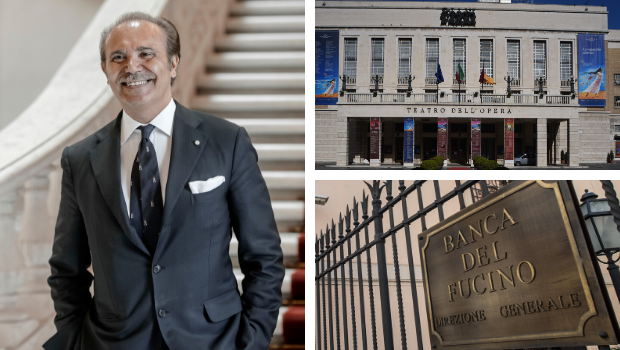
During his time as CEO at Consap SpA, Masi successfully managed to pursue a parallel career in banking with Igea Banca and Banca del Fucino.
"There is no doubt that Mauro Masi is a colourful larger-than-life figure in comparison to most of his peers on the EPO's Administrative Council."He also appears to have the good fortune to be one of the most highly remunerated members of the Administrative Council.
For example, back in 2010 his annual salary as CEO of RAI was a mouth-watering €€ 715,000.
In 2012, his annual salary as director of Consap SpA was reported to be € 473,768. That seems to be somewhat lower than what he was getting at RAI, but appears to be a "basic salary" figure which excludes any bonuses that he might be entitled to. In any case, having regard to his parallel activities at Igea Banca and Banca del Fucino, his salary from Consap is unlikely to be his only source of income.
Masi's track record back home in Italy gives the impression that he was a faithful servant of the powers-that-be. In particular, during his time at RAI he showed himself to be an obedient lapdog of his political master Berlusconi.
"Masi's track record back home in Italy gives the impression that he was a faithful servant of the powers-that-be."Based on that track record, one might be inclined to think that Masi would have been an enthusiastic ally of the EPO alpha-male Battistelli and that he would have relished the opportunity to assist the Corsican tyrant's efforts to "bust ass" at the EPO.
However, that turns not to have been the case. As a matter of fact, relations between Masi and the French EPO President were "strained", to put it diplomatically. This resulted in a situation where the Italian delegation frequently adopted a critical stance on measures proposed by Team Battistelli.
This rupture in the traditional Franco-Italian alliance can be traced back to the manner in which Battistelli is reputed to have duped the Italians into supporting his bid to become EPO President in 2009/2010.
According to EPO insiders, the Italians were cajoled into supporting the Corsican pretender on the basis of a promise that when the spoils were to be divided out afterwards they would be rewarded with one of the soon-to-be-vacant Vice-President posts.
"According to EPO insiders, the Italians were cajoled into supporting the Corsican pretender on the basis of a promise that when the spoils were to be divided out afterwards they would be rewarded with one of the soon-to-be-vacant Vice-President posts."But when the time came to deliver in 2012, Battistelli reneged on his promise and forced the Council to accept his Croatian nominee Željko Topić rather than the Italian candidate.
The Italians never forgot this "betrayal". It is worth noting that subsequently, in 2017, Italy was the only EPO member state to nominate a rival candidate to Battistelli's anointed successor António Campinos.
And so it came to pass that when the Administrative Council voted on the infamous "Strike Regulations" in June 2013, the Italian delegation withheld its support and expressed a well-founded concern that the measures proposed by Battistelli would lead to "a limitation of the right of staff to strike".
The statement of the Italian position, recorded under point no. 119 of the minutes of the 136th meeting [PDF] of the Administrative Council, reads as follows:
The Italian delegation welcomed a clear legal framework, which was important to promote sound social dialogue. But it feared that some proposals might lead to a limitation of the right of staff to strike. It encouraged to review some parts of the draft.
"Masi - in common with most of the other "abstentionists" on the EPO's Administrative Council - was extremely cautious about criticising the EPO President in public."In May 2016, when the Italian state broadcaster RAI produced a report on “La guerra dei brevetti” ("The war of patents" [PDF]), Masi was asked to comment on Battistelli's controversial "methods" at the EPO.
Mauro Masi has been a member of the EPO’s Administrative Council since 2006.
What does he think of the President Battistelli’s methods?
MAURO MASI – ITALIAN REPRESENTATIVE, EPO ADMINISTRATIVE COUNCIL
Battistelli acts properly, he respects all the formal rules of the EPO. The issue is whether those rules are still valid or whether they should be changed. In my opinion they should be changed.
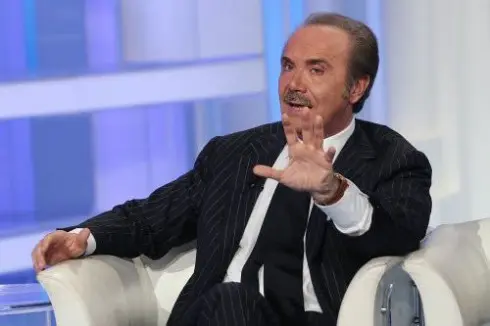
Despite his personal antipathy towards Battistelli, Masi appeared to rally to the defence of the controversial EPO President in 2016: "Battistelli acts properly, he respects all the formal rules of the EPO."
"...changing the rules is a matter for the Administrative Council or, in the case of the EPC itself, a diplomatic conference of the contracting states."In particular, it would be interesting to hear what lessons - if any - he has managed to draw from the ILOAT judgments that overturned Battistelli's Vichyite "Strike Regulations".
Unfortunately, despite the fact that he still remains in position as head of the Italian delegation, Mauro Masi has so far remained eloquently silent on these matters.
Given that his 70th birthday is approaching - in August 2022 - it's quite likely that Masi will have sailed off into the sunset of a gold-plated retirement with his partner, the RAI presenter Ingrid Muccitelli, before we get a chance to hear his opinion on what needs to be done to tackle the long-standing and still unresolved governance crisis at the EPO.
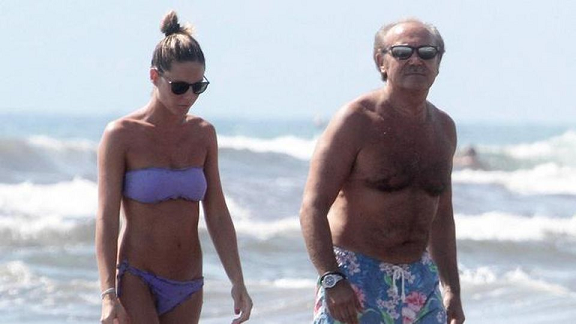
Mauro Masi will probably have sailed off into the sunset of a gold-plated retirement with his partner Ingrid Muccitelli before we get a chance to hear his opinion on how to tackle the EPO's governance crisis.
"We will also see how neither the Administrative Council nor Battistelli's successor Campinos have bothered to take any action to address these unresolved issues."However, among the 38 member states of the organisation, not a single delegation could be found with sufficient moral courage and integrity to vote against this "extremely dubious" proposal.
In the final two parts of the series, we plan to take a closer look at how this affair has highlighted the serious governance deficits at the EPO which were ruthlessly exploited by Battistelli during his time as Office President.
We will also see how neither the Administrative Council nor Battistelli's successor Campinos have bothered to take any action to address these unresolved issues. ⬆